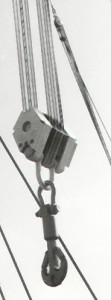 effluxes (or effluences), theory of _ Philosophy Theory associated with Greek atomism and its revival in the corpuscularian philosophy of the 17th century as well as by non-atomists like Empedocles (5th century BC).
effluxes (or effluences), theory of _ Philosophy Theory associated with Greek atomism and its revival in the corpuscularian philosophy of the 17th century as well as by non-atomists like Empedocles (5th century BC).
It holds that objects continually emit films from their surfaces, which cause them to be perceived, much as we ourselves might explain smell. Lucretius (1st century BC) also uses the theory to explain dreams and imagination, and thought in general.
– Dictionary of Theories by Jennifer Bothamley

 pinnace, small and fast warship employed in the sixteenth century for scouting and dispatch duties.
pinnace, small and fast warship employed in the sixteenth century for scouting and dispatch duties. TACKLE, … a machine formed by the communication of a rope with an assemblage of blocks, and known in mechanics by the name of pulley.
TACKLE, … a machine formed by the communication of a rope with an assemblage of blocks, and known in mechanics by the name of pulley.